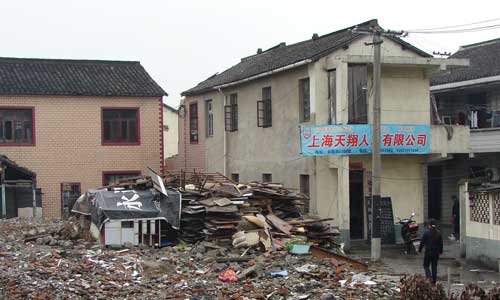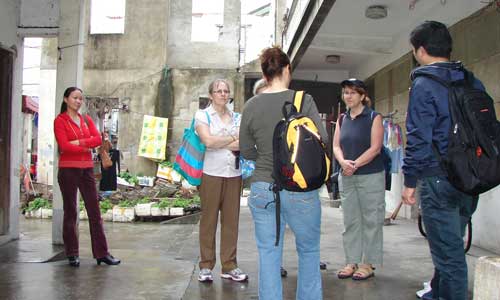Rich dreams for the poor
A tourist introduces snack food to a child at a migrant workers' community.
Wang Ping is a food vendor from Anhui Province. At a corner on Jinqiao Road last week he could be found joking with a group of foreign tourists that they should find him a girlfriend from abroad. He laughed loudly at the suggestion and the tourists began to laugh as well. Then those around got the joke and joined in the laughter. It was not what most of the tourists expected.
They had joined a migrant neighborhood tour and laughter was not obviously on the agenda as they sought to find out about life for Shanghai's downtrodden class. Migrant life is, as reported, an existence filled with immense suffering. Poverty, joblessness and homelessness are part of the story, we are told. And the reports are correct. Shanghai is home to 9 million migrants, only some of whom are documented. Laborers, even in this neighborhood, hang out on quiet corners and wait for employers to offer them jobs. Apart from making a joke about getting a foreign girlfriend, Wang did little to change the popular image of the suffering migrant. He admitted being homesick as a result of his life in Shanghai, as were the people around him, and hinted at very mixed feelings about being here.
"I've got no options. I've got to make money for my family. I miss my home very much, but I've got to stay here. I need money," Wang said. He did say, however, that Shanghai was a very modern city and it could be interesting, especially when it came to earning money.

Many buildings in migrant communities have been turned into piles of rubble. Photos: Erick Peterson/GT
Money on the mind
Money is very much on the mind of the migrants who live near where Wang sells food. The area, near the intersection of Jinqiao Road and Zhangjiabang Road in Pudong New Area, is a migrant neighborhood, an area where people of many non-Shanghai dialects live and work, while struggling to understand one another's poor Putonghua. It is also a place that is falling apart. Some buildings have already been torn down and now exist just as piles of rubble. Other buildings look as though they will fall soon, either to time or progress. People in the neighborhood say that they expect the neighborhood to be razed, though they do not know when. They say it will be redeveloped.
They are not as concerned with the direction of their neighborhood, though, as they are with their own personal fortunes. Just as Wang, the girlfriend-seeking food vendor, is sending money home to his parents in Anhui, so too, other migrants in the neighborhood are trying to improve their families' lives. These migrants, apparently in one of the most thriving migrant communities in the city, were optimistic. They believed the future would be better than the present, and they had reasons to think so.
The tour was led by Tracy Lesh, owner of a travel agency called Shanghai Tea Trek. The American conducts these migrant neighborhood tours in partnership with the Shanghai Community Center.
"I think this view of migrant life surprises a lot of people. Everyone comes expecting to see poverty. We know only what we see in the newspapers and on television. That's why I ask people at the start of the tour what they expect from this. At the end, they have a different attitude," Lesh said.
Lesh was not speaking so much about the humor found in migrant neighborhoods but the real-life stories of people being able to create better lives for themselves and their families in these places.
As she leads her group through a neighborhood, the signs of poverty abound, and she points them out. There are buildings that most people in the developed world would consider uninhabitable, garbage is scattered everywhere and watching from a short distance is a loitering group of women she suspects are prostitutes. But then, face-to-face with people at work, she and her group gather a very optimistic view of migrant life.
"I have a plan," said Li Tang from Shandong, another migrant the tour meets. He spells out the plan. He is saving money and keeps his expenses to a minimum. "Everything's okay. The quality of life in Shanghai is much better than that in my hometown. My family all lives here. I work, my mother and wife take care of our daughter at home until she can go to school. She'll go to elementary school and then we'll return home so she can go to junior high school. Our rent is only 350 yuan ($55) per month, so we can save," he said.
Li said that the family will return to Shandong in time for his daughter to go to junior high school because they have a Shandong hukou, not a Shanghai one. The hukou, a major concern for all migrant laborers, allows them special benefits in their hometowns.

Tourists ponder the lives of migrant workers during a visit to their neighborhood.
Residential ambitions
Some of the migrants in this neighborhood have ambitions to achieve Shanghai residency, however, and gain the dreamed-of hukou.
Jiang is a small woman with big dreams which include owning a home back in Hunan, education for her son, and owning a home in Shanghai. If these goals sound impossible for Jiang, an ayi who works for foreigners in the city, they are not. In the past seven or so years, Jiang has actually already achieved most of her goals. With her and her husband's salaries they have put their son through vocational school studies. It cost 30,000 yuan for a year and a half of vocational studies but this will help him find a good job.
"Paying for the school was not a big problem for this family. I make money myself, and my husband makes money, too. In a year, we might make 100,000 yuan. So this is all really good," she said. There was more than enough to pay for her son's schooling.
The larger expense for Jiang and her husband was purchasing a 300,000 yuan house in Hunan, their home province, in 2006. She showed pictures of this home, where her father-in-law now resides, with almost the same pride she exhibited showing photos of her handsome young son and his girlfriend. Some day, her son will marry, and Jiang will be able to help him start a new life.
Jiang's proud boasting takes place in front of the "studio apartment" she and her husband share. More of a cell than a home it has space for a bunk bed and little else. Its walls are decrepit and grimy. There is no running water, kitchen or bathroom. The top bunk is stacked with boxes that contain their lives – there is no room for cupboards or wardrobes. But is cost 350 yuan a month.
"Next I'll pay for my son's wedding. Weddings are expensive. Then I'll look to buy houses. There's still so much to do. It's endless," Jiang said. The houses that she intends to buy will be in Shanghai. As property owners, her family will then be eligible for a Shanghai hukou.
Banking on baking
Jiang is not by any means an unusual story in this neighborhood. Others talk about success, including a baker surnamed Wang and her baker husband, who run a bakery that is creating more than cakes and pastries. They are also creating a better future, having come from Anhui to start their dream 10 years ago.
Things have certainly changed a great deal for the pair. Ten years ago in Anhui,they were farmers who had just spent all of their money on a new home. Without any money, they decided to go to the one place where they felt they could earn real money – Shanghai. They came to Shanghai, changed professions and started working for a shop selling foodstuffs. In time, they took over the shop and then expanded, adding new lines. Wang and her husband worked hard to learn new cake-making skills, which they picked up from local Shanghai bakers.
Their earnings, coupled with their strict saving plan, allowed them to have more money for their family. Wang has two sons, 20 and 7, and she has put her eldest son through university with the money she has made. She has big hopes for both boys. Now here for 10 years, she is trying to save the money that will continue their education and then pay for their weddings and homes.
These successes are in spite of local bigotry and misunderstandings. Migrants say Shanghai people often get angry when others do not understand the Shanghai dialect and often express negative feelings towards migrant workers.
"The discrimination varies from person to person. Some people are not friendly, but many people are friendly. Yes, every migrant worker talks about discrimination, and we all get depressed about it," Wang said. "For me, I'm able to deal with it. I respect others, and they should respect me."
But a Shanghai woman surnamed Wang, the owner and operator of a neighborhood mahjong house believes migrants make for difficult customers, and she is wary of them.
Bad feeling
"Only locals come here to the mahjong house. Migrant workers do not come here. I have heard incidents caused by migrants. They make a mess. Then after they finish playing some say, ‘I don't have money to pay this time. I'll pay next time.' But they disappear," she said. But Wang said that she does allow some migrants in, but they have to be people that she knows. She watches for trouble. She said migrants frequently quarreled with each other and caused trouble.
She has seen the neighborhood change a great deal over the past two decades as migrants started to come in and now, she feels, they dominate her neighborhood. It worries her, as she has invested a lot in her establishment – from the two electronic tables to the time and effort she puts into her business. Wang's place is open from before noon to midnight every day. She repeatedly said that she does not want trouble.
But then, with the neighborhood slated for demolition at a yet-to-be-determined time, it is hard to know if there will be any time for trouble, or anything else. The neighborhood in which many migrants live and work will disappear. All that will be left is the memory of people who worked very hard and lived for dreams.
Information about the migrant neighborhood tours can be found at the Community Center's website www.communitycenter.cn or on Tracy Lesh's website, www.shanghaiteatreks.com.